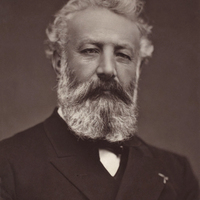How to cite this page Comment citer cette page
Verne, Jules
Person
- Media metadata | Métadonnées multimédias
- has biography | a une biographie
-
French novelist, poet, and playwright. Verne’s writings have been celebrated across the world, but his complex relationship to nineteenth-century imperialism has been less well-documented.
Verne was born in the city of Nantes in 1828. Nantes had been France’s largest slave-trading port, with over 1,700 recorded voyages departing from the city between 1657 and 1841 according to the SlaveVoyages database, and Verne’s family on both sides had close connections to the slave trade. William Butcher (2006) has identified Verne’s great-grandfather on his mother’s side as a slave-trader, and his father Pierre Verne (1799-1871) had Nantes slave-traders among his clients. Verne’s great-uncle, Alexandre Verne (1782-1836), had also married into the Bernier slave-trading family.
Many of Verne’s novels deal explicitly with race, slavery and colonialism. Un capitaine de quinze ans (1878) and Nord Contre Sud (1887) examine slavery in Africa and the United States respectively. More popular works by Verne feature a number colonial characters, such as the Indian princess Aouda and colonial officer Sir Francis Cromarty in Le Tour du monde en quatre-vingts jours (1872), as well as many colonial settings, exemplified by Verne’s first novel Cinq semaines en ballon (1863) which is based upon a imaginary expedition to Africa.
Achille Mbembe (2013) situates Verne’s novels within the late-nineteenth century “colonial education of the French”, in which ideas of racial difference became heavily normalised throughout mass culture in the metropole. - was born | est né
- 8 February 1828
- died in | est mort par
- 24 March 1905
- has nationality | a la nationalité
- France
- has type | est de type
- depicted
- is referred to by | est référencé par
- Wikipedia
- Nantes, The Slave-Trade, and Slavery
- William Butcher, Jules Verne: The Definitive Biography (New York : Thunder's Mouth Press, 2006) - Internet Archive
- Achille Mbembe, ‘The Well of Fantasies’, in Critique of Black Reason, trad. by Laurent DuBois (Chapel Hill, N.C.: Durham University Press, 2017)

